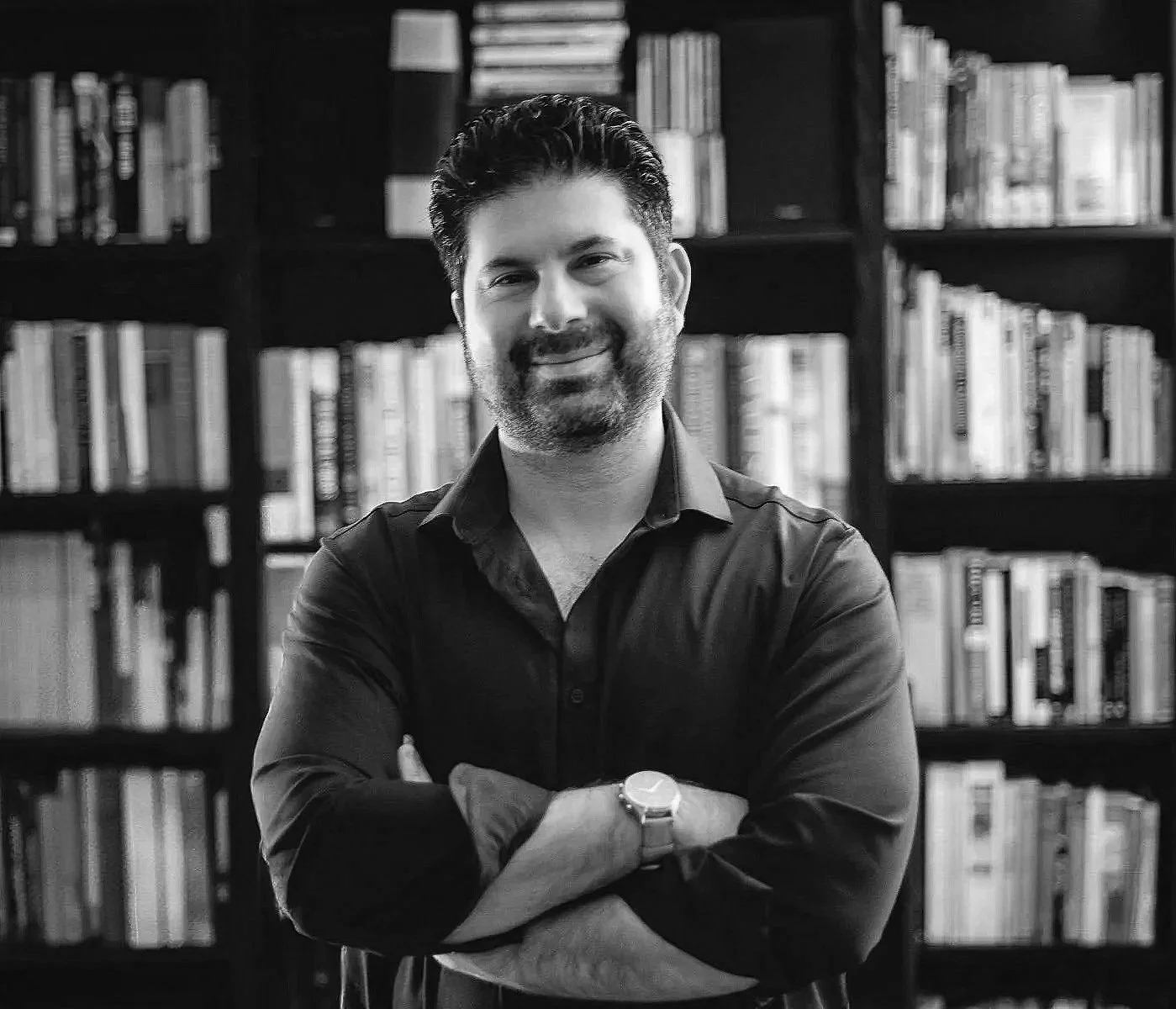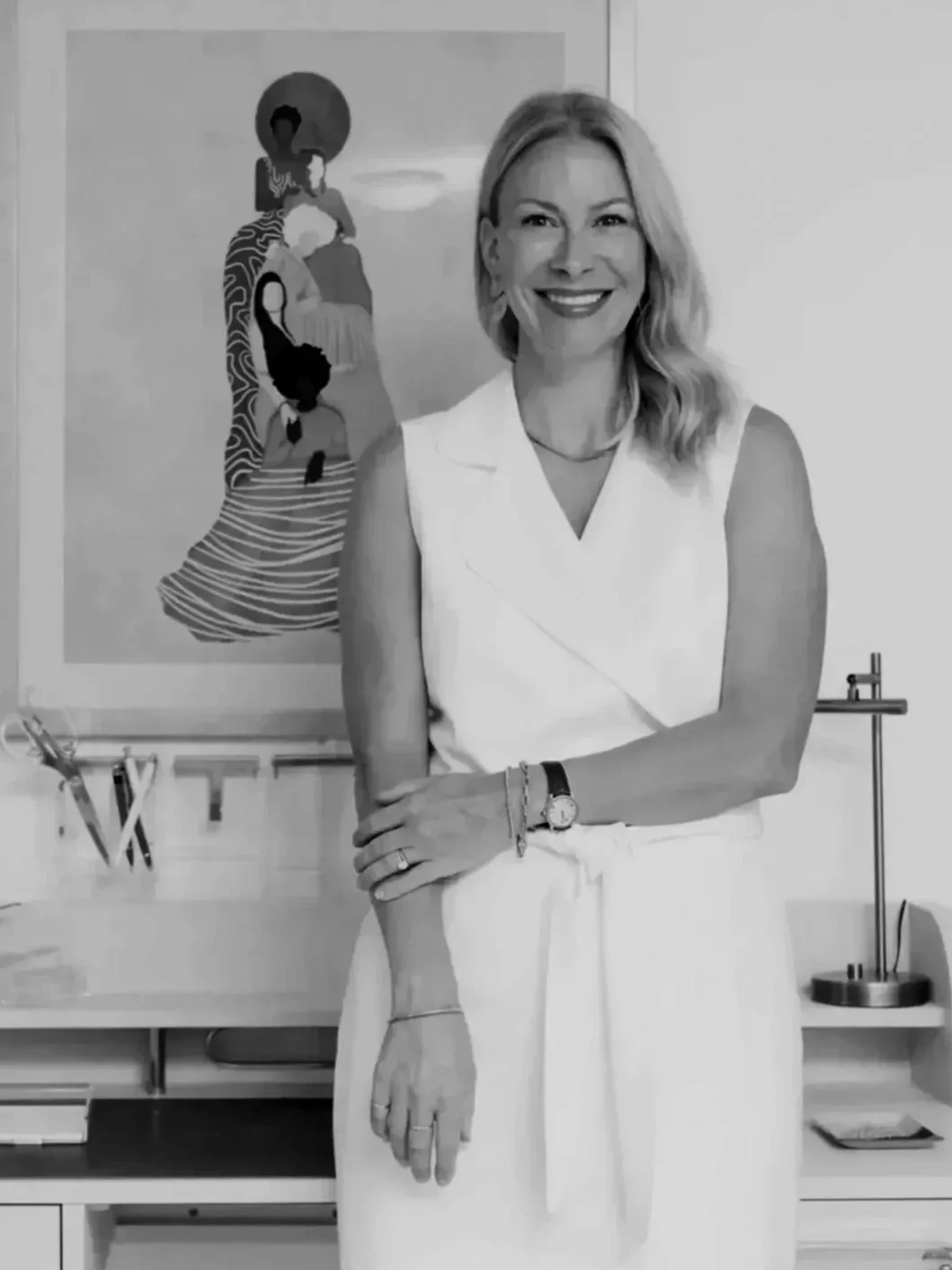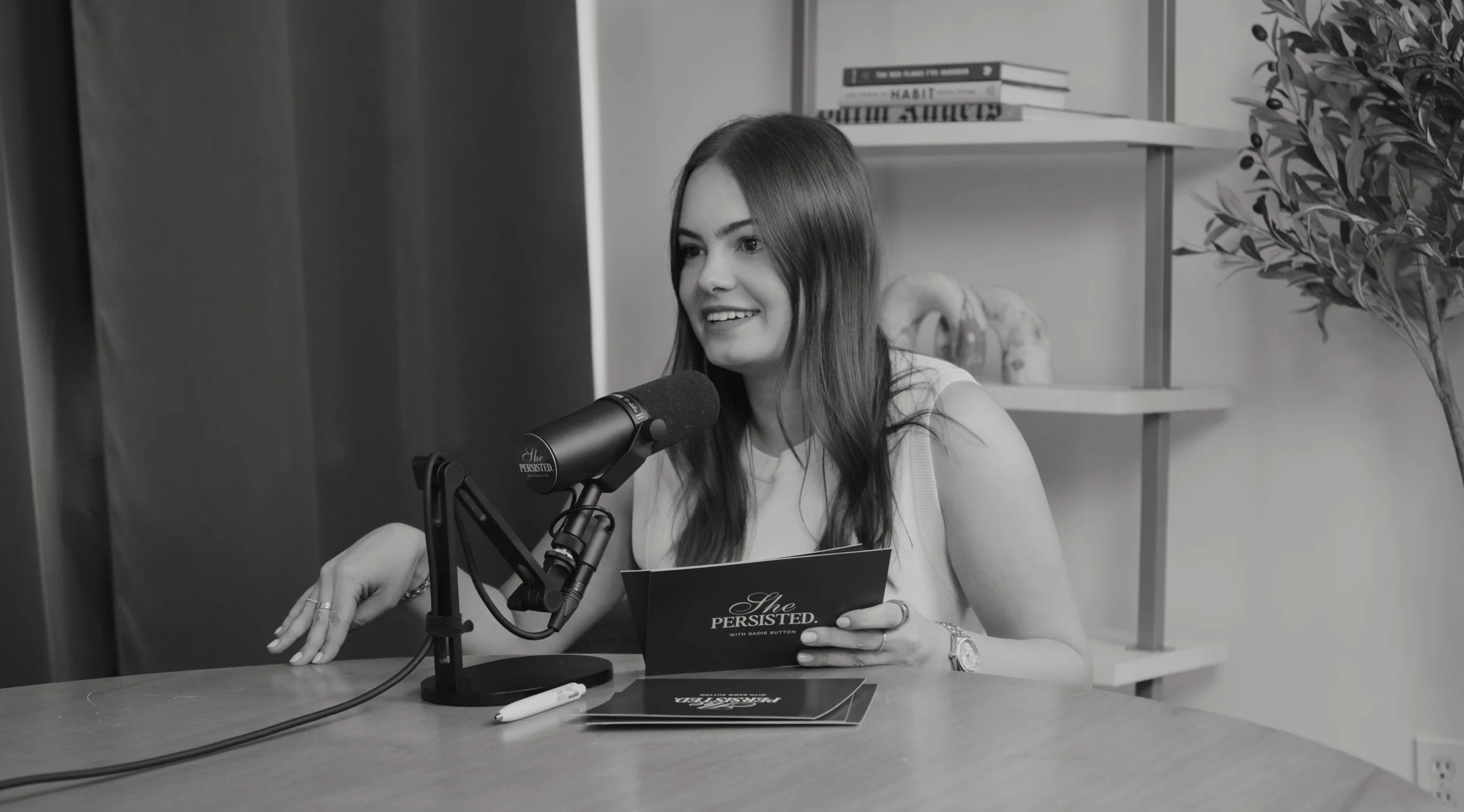227. I asked 9 experts how to heal from depression (what you NEED to know)
listen to this episode:
Tune in and subscribe on your favorite platform: Apple Podcasts | Spotify | YouTube | Amazon | GoodPods | Castbox | iHeart Radio | overcast | pocketcasts
today’s episode is a mental health mashup featuring expert advice from some of my favorite she persisted guests. i’ve compiled the most insightful tips and quotes from past episodes into your ultimate guide on how to navigate depression.
in this episode, you’ll hear from a range of psychologists, therapists, professors, and best-selling authors on why so many of us struggle with depression and how we can begin to recover.
we talk about:
what actually causes depression
the lived experience of being depressed
stigma + shame surrounding depression
how to start healing from depression
ways to support a loved one who’s depressed
+ so much more!
Mentioned:
SHOP GUEST RECOMMENDATIONS: https://amzn.to/3A69GOC
About She Persisted
She Persisted is THE Gen Z mental health podcast. In each episode, Sadie brings you authentic, accessible, relatable conversations about every aspect of mental wellness. Expect evidence-based, Gen Z-approved resources, coping skills (lots of DBT), insights, and education in each piece of content you consume. She Persisted offers you a safe space to feel validated and understood in your struggle while encouraging you to take ownership of your journey and build your life worth living.
a note: this is an automated transcription so please ignore any accidental misspellings!
Sadie: [00:00:00] Welcome to She Persisted, the Gen Z Mental Health Podcast. I'm your host, Sadie Sutton. Let's get into it.
Dr. Hollon: I think where people get stuck, they've gotten into blaming themselves for things that have gone wrong.
We take it to heart and we blame ourselves. We think we're unlovable or we think we're incompetent but it's usually not the case that people are accurate
it's usually something in their behavior.
Sadie: Hello, hello and welcome to She Persisted. If this is your first episode, buckle up. You are here for a good one. If this is not your first episode, welcome back. I'm so excited for you to listen to this. We are doing our first ever mental health mashup, so we have compiled a bunch of expert advice on navigating depression and understanding why we get depressed, how we can shift those feelings and behaviors, and really what it is that you're experiencing, and how to support someone navigating that.
So you are about to get really a masterclass from some of the top depression researchers, clinicians, professors,
authors, podcasters, and voices in this [00:01:00] space.
I know you will leave this conversation feeling empowered, educated, and having a better understanding of what you're experiencing,
why you feel the way you do, and what you can do to shift that. So before we dive in, you're gonna hear from Hans Schroeder, a clinical assistant professor of psychiatry at the University of Michigan Medical School.
He researches the beliefs and messages about mental health and their impacts. You are also gonna hear from Dr. Ayelet Ruscio, one of my professors at Penn. She researches anxiety, depression, why they're different, why they're similar, and how they show up in our lives. You're gonna hear from my therapist, Dr. Caroline Fleck, a licensed psychologist, consultant, and adjunct clinical instructor at Stanford University.
She's also the author of Validation. You're gonna hear from Dr. Judith Joseph, a board certified psychiatrist and researcher at Columbia University and an assistant professor at NYU. She is an expert on high functioning depression and also a major voice in the social media space. You're gonna hear from Kathryn Gordon, a licensed clinical psychologist, [00:02:00] speaker, and author specializing in cognitive behavioral therapy and using CBT skills to prevent suicide. You will hear from Dr. Margaret Rutherford, a top podcaster, psychologist, and author. She's the originator of the 'perfectly hidden depression' term and offers expert insights on why some individuals might be experiencing really intense depressive symptoms, but might not show those outwardly. You're gonna hear from Cornell professor Dr. Jonathan Rottenberg. He's also a top researcher
who explores long-term functioning and wellbeing after depression.
You are gonna hear from one of the greatest depression researchers of our time, Dr. Steven Hollon. He is a professor at Vanderbilt and his work has completely shaped the field of depression research. And lastly, you will hear from authors Liz Fosslien and Mollie West Duffy. You definitely seen their doodles across social media
and you might have read their books, No Hard Feelings and Big Feelings. There are a lot of different theories about why people feel depressed. Listeners might have heard of the Chemical Imbalance Theory or maybe heard that it has more [00:03:00] to do with the context you're in or how you're thinking about the challenges that you're navigating.
What is your perspective on what causes depression?
I like to think about this as needs not being met. there's universal needs that we need.
We need to love. We need to be loved. We need to have a sense of respect. We need boundaries. We need space. We need meaning in our lives, and if something's gotten in the way of us being able to meet those needs, depression's going to come up and tell us about that. It's going to try to tell us that, at least.
Dr. Ruscio: kind of on a level. What is often happening in depression is individuals have a heightened sensitivity to stress. and heightened reactivity to stress. So areas of the brain particularly the amygdala are sort of heightened in individual with depression.
So a tendency to experience negative emotion, to react very strongly distress. And we see that prefrontal cortex areas of the brain that are involved in planning and in self-control self-regulation. Are reduced activity in those areas are
Sadie: [00:04:00] reduced.
Dr. Ruscio: And in terms of the crosstalk between the limbic system and the prefrontal systems of the brain, they're sort of less tamping down of emotion by those frontal regions of the brain. And so people with depression kind of a universal feature is the sort of heightened sensitivity and heightened reactivity when stressors.
And all of us experience an increase in distress, an increase in sort of that cortisol response when we're stressed, that is normal. It's actually very adaptive. What seems to happen in depression is that people have trouble shutting that process off in a prompt way.
Dr. Hollon: I'm very much interested in the evolutionary perspective no evolutionary biologists would think about anxiety, pain or depression as being, , , aberrations.
They would think of this being evolved adaptations that served a purpose. what they would do is follow the energy. And if you've got an infection, the energy goes to the immune system. You don't want to date.
You want to think, you're not interested in food. If you're starving, the energy goes to foraging for food and, , preserving the vital organs. If you're [00:05:00] clinically depressed, the energy goes to the cortex. And the energy goes to really thinking long and hard and carefully about whatever's going on in your life.
that's probably not a bad thing to do from time to time. You don't want to make a habit of it, but it's not a bad thing to do.
So that that's where I think that goes, but I think we're wired up to, , think carefully about things when we get depressed
Okay.
Dr. Joseph: I think that, you know, with early education, we start off in the right place these days. We spend a lot of time with face charts and emotion charts and children looking at charts and saying like, I feel pain. I do think that in certain circles We tend to move away from it. It's like, we start off in the right place. We teach kids that, it's important to feel, you got to listen to your body, you got to know when you have to go to the bathroom and eat and be hungry and need soothing.
But then when you become an adult, , it's like, well, stop thinking so much about your emotions and do stuff, ? And so a lot of us will sit through, you know, an entire exam holding our, our urine, not pee, or we'll sit and, , study and like, And then like [00:06:00] overeat at night.
You know, we don't listen to our bodies. We don't listen to our emotions. It's almost like the more higher level, , that we get in terms of our intelligence and our stature and our careers, less attuned we are to our emotions. So I think we do need to go back to the basics in many ways
Dr. Rottenberg: there's almost, Certainly a multitude of factors that are going into it rather than a single factor and the world's not a Controlled experiment where you can isolate the factors. So all these things are happening simultaneously but I do believe that depression often is about expectations, so, not only the expectations for, , the way that you're feeling, but also expectations about where you should be in life, relative to where, you You're actually in life.
You do have a lot of people who have very, very high aspirations that may not be fully plugged into reality. So people saying, Well, I'm going to be a millionaire before I'm 20 years old. I'm going to be instagram famous.
I'm going to get into Harvard, or wherever and they may not, to the extent [00:07:00] that they don't have, , a plan for making this happen, that's opening the door to tremendous, , disappointment.
That's not necessarily depressional by itself, but disappointed aspirations, I think, is a part of the mix. And part of that, those disappointing aspirations, and I'm sure you've heard this, is it is harder. It is harder to make it, in , a complex, competitive society than, than maybe it was for parents or grandparents, it's hard to break in economically, it's hard to finish your education, there's such rapid change, it's really quite a rich area and there's lots of room, I think, to improve our ability to explain what's going on.
Sadie: I'd love to kind of hear your perspective, are there any shifts that we see in people that are depressed with the way that they feel and think and behaviors? Where you're literally thinking and acting differently when you're depressed, which when you're first diagnosed, a lot of people aren't told that. It's, it's really a challenging thing to understand.
Dr. Fleck: one metaphor I use and these are these are kind of extreme but it would be like if you [00:08:00] had your hand on a burning stove.
All you would be able to think about is getting your hand off that stove. Not what you were gonna wear to the party. Not getting your math assignment done. It would be hard to focus on anything else
You can't see clearly in that amount of pain. We can, we can understand that because we've all experienced physical pain.
Dr. Joseph: When we're suffering and struggling, it's actually hardest to do the things that would help us most. For example, we know that connecting with people when we're depressed or anxious in a lot of ways, that's really helpful.
We know that when we fear things. The thing that helps the most is to face those fears. And yet the nature of those mental health struggles is that you want to avoid those things. They seem like they're too much to even take on. That hopelessness feels like there isn't any point in doing anything.
And when someone says to someone who's hopeless, well why don't you just do these things and you'll feel better. Unfortunately, that can make things [00:09:00] worse because it can feel, the person can feel ashamed for not thinking about it that way or not being able to do those things that might help them.
Sadie: I feel that there's a natural pull for people to want to not feel alone.
someone else is experiencing this too, wow, that is super validating in and of itself. I'm not alone in this experience. And we can take that too far and say, Oh, this is my identity now. This is who I am. So we're seeing the entire world as, this is just my depression. I am depressed. I'm a depressive person.
And this is how it's going to be. The depression experience in and of itself is, you know, by definition, it engenders a sense of hopelessness. low energy, low motivation to address the things that you might need to address. So it becomes kind of this reinforcing cycle where I don't even know where to start and I'm too tired to do anything about it.
So then depression lasts for a lot longer and then we think this is just how it's going to be.
Dr. Rottenberg: You know, people who haven't gone through depression, they might be sympathetic, [00:10:00] but not understanding this, they could be quite confused about why depressed people are doing certain things.
So for example, , depressed people might do things to themselves like they might, , burn their arm or, or pick their skin, , and do other things where the person is like, well, how could that be helpful? And don't they know, don't they know that you should go for a walk and do yoga and depressed people are not stupid. They have a, they have this unique experience of cycling through, , all manner of emotion regulation strategies, including all the ones that were suggested to them on numerous occasions. And finding that They didn't work So then depressed people might start doing things that they might actually not be such great ideas, but they're trying.
They haven't given up and they, might get locked into some of these counterproductive strategies, but you can only, really, , understand that. If you have, you know, empathy and also knowledge that depressed people don't on day one, the first day I'm depressed, I go [00:11:00] immediately and start screaming into a pillow or, , you know, banging my fist through the door like that is not what happens on day one.
So, not as much research as you would imagine, , tries to take people through time to understand how the experience changes, one of the interesting things, and we know from basic research, I find this fascinating, is that non depressed people, they tend to mispredict. So for example, if you have a favorite team and, someone asks you, so if your team doesn't win the Superbowl, how are you going to feel?
And the The people systematically, they overestimate. They say, I'm going to feel horrible. And man, I can't even imagine. , it's going to take a long time to recover from, but the truth is that even, things that are more significant than, , your football team not winning, , people tend to bounce back from.
And so this is the normal experience that people have that these really strong moods don't last. , so it's only people who are in the, These clinical states where the mood might last for three months, [00:12:00] six months, a year, two years, that, , they really don't, experience as much relief. And it's quite confusing because their whole previous life, when they were able to either change what they were feeling or just spontaneously experience change in what they're feeling, they're no longer experiencing that.
And it's confusing.
Dr. Hollon: I think where people get stuck, at least the folks we usually see clinically, they've gotten into blaming themselves for things that have gone wrong. close to I didn't study hard enough for the test or as opposed to, , you know, most relationships or practice relationships and you get better with it with practice, etc.
We take it to heart and we blame ourselves. We think we're unlovable or we think we're incompetent but it's usually not the case that people are accurate when they make a global stable internal attribution to some defect in the cells.
It's usually something in their behavior. And they can work.
Sadie: Gen Z has really been a leading voice in trying to decrease stigma, speak more openly about mental health challenges. What are your thoughts on how stigma shows up with respect to depression? Are there any issues [00:13:00] specifically relating to feeling depressed that we need to be more open about and give a voice to?
Dr. Ruscio: So general population surveys in the us have shown that approximately half of the adult population in the us will have a mental disorder at some time in their life. That's probably an underestimate. Yeah, because people may be reluctant to report, especially since these surveys are usually done with lay interviewers who are stranger.
And these are sensitive things to talk about, especially with some stranger who's come to your home. Right? And so when people are followed forward in time, we actually see rates as high as 70 or even 80% of people will eventually develop a mental disorder. Wow. Now that's really important and hopeful in a way, because it tells us that.
It need not be stigmatized to have a mental disorder. In fact, the more rare and unusual situation is the person who reaches, you know, the age of 80 or 90, having never had a mental disorder. . I so I think it's just important to recognize. Mental illness is all around us in one form or [00:14:00] another. And that having experienced this, we're not alone, we're actually in the majority.
Mollie West Duffy: there's a lot of stories that we hear about in the media of people having suicidal thoughts and acting on them.
And I'm glad that those stories exist because it's really important to share those as well as painful as they are. you know, there's, there needs to be more stories. Of people having these thoughts and being able eventually to go through periods where they don't have those thoughts anymore, or they don't have those thoughts as frequently.
So they're not disrupting their lives as much as they were.
Dr. Rottenberg: I think the more people become familiar with it the more it gets Detoxified and it becomes a little bit less radioactive.
It's still not easy. There still is a tremendous amount Uh, , discrimination that happens for lack of a better word and often in high stakes, , situations like, applying for jobs or forming relationships, , there's a lot of fear, , a lot of fear of mental health problems and they can be seen as absolutely [00:15:00] disqualifying and we're wasting of just a huge amount of, of some of our most talented people.
, because the difficulty of understanding, , what can be a wide gulf, , between people's experiences. So I think we really do more of this, , and, and not just kind of speaking in some of the cliches that it's easy to do, but just not that helpful, give people the, the 3D, , picture of these sorts of experiences and bringing them back into.
the things that are discussable in polite conversation and it doesn't make you weird But it is a real shame.
Sadie: I'm curious what strategies, interventions, tips, skills, et cetera, do you recommend for people that are struggling with depression and are working to alleviate those emotions and shift those behaviors?
Dr. Joseph: I think listening to your bodies is so important. It sounds like simple, but we really do have to go back to the basics. And remember, a lot of us are just pushing through life, not feeling, not acknowledging, and just hoping and holding our breath and [00:16:00] hoping that it gets better.
It's not going to get better, you know? We have to acknowledge it. We have to respect how our body and our minds feel and honor that. And that's a good place to start, which is not easy. It sounds so granola, but it is so not easy. It's it can be very painful for people. And there are people in. Who are in treatment with me for years.
And they have to relearn how to like get back in touch with their bodies and their minds and their emotions. So, , but that's a good place for us all to start
so I think about a couple of different types of behaviors and one thing that I use as a therapist is the idea that there have to be a menu of options because different things work for different people.
So if one thing doesn't work, okay, well, we have nine other things or 10 other things and that in itself can build hope. Getting through it. So one category I would say is self soothing. And when someone's struggling with a mental health problem they often are punishing themselves.
They don't even think, Oh, now's the time to actually soothe myself. So I think about if [00:17:00] you have the flu or you're sick, least some part of you knows it's not your fault. It's just something that happens and you kind of have to go easy on yourself. You have to have. Comfort foods, you, you can't do the things you normally do.
Hopefully you can call out of work. And so I try to make that analogy that when you're struggling and in a lot of pain, that is the last time for more punishment and self criticism. So things that tend to soothe people, I think a lot of it, a lot of people go to music. A lot of people go to, I like stand up comedy because it's kind of the opposite of self criticism.
Feeling bad when you're laughing. And I think the other part of it is that actually there's so much comedy now about mental health stuff. So I kind of have like a. two functions where it's funny and you can resonate with it. So those are a lot of them getting outside, like just changing the perspective , going for a walk, taking a hot shower, anything that captures your attention and feels positive can be helpful.
Dr. Gordon: And then the other piece I would say with the behavior [00:18:00] is trying not to isolate. And one way to do that is to reflect on your values. And so a lot of it boiling down to basics is Spending some time to reflect, what are my values and what am I doing in my life that connects me with those values and they don't have to be huge things. If you value being compassionate or charitable, Or educated or whatever it is, you can find something, something to do that just kind of connects you with that value.
And then life doesn't feel so empty. And so it's worth thinking about those types of things and making action plans for what something I might do to enhance that meaningful feeling.
Dr. Ruscio: generally speaking, , doing activities that are active are good.
So exercise. Always recommended as a way of improving mood, as well as keeping you sort of healthy and fit doing activities that give you a sense of mastery and accomplishment are good. So these can be [00:19:00] pleasurable activities, but they can also be things that aren't all that pleasurable, but that gives you a feeling of accomplishment, like, okay, did the laundry check, right?
Yes. You know, I, I ran this errand that had to be done check where you feel like, okay, I'm accomplishing things. So those are good too, but especially good are activities that give you a. Pleasure things that you really enjoy that can be by yourself or with other people. It doesn't have to be a great big thing.
It could be as simple as, okay. I'm going to go for a walk with a friend I'm going to spend some fun time with a sibling I really enjoy. You know, reading this particular author, I'm gonna go to the library and, and get a book. I really enjoy reading. All of
Sadie: those are good things.
Dr. Fleck: I suffered from depression I was, , in high school and in my early 20s so I was in a pretty serious episode of depression for what felt like almost 10 to 15 years and I had just tried everything and I frankly found Many of the providers that I [00:20:00] spoke with to be, really invalidating.
I found therapy often was punishing, confusing, and not helpful.
Yeah.
And so, in addition to therapy, I had tried a bunch of other, you know, interventions, meds, x, y, and z, and nothing had really helped. And what I had found to be really helpful for me The only thing that seemed to have any real substance to it was meditation.
meditation for me was just the only space in which I could kind of calm my mind and maybe get a sense, just a slight taste, of what freedom from suffering would be like. And so I was really interested in mindfulness based therapies
It gave me insight into the judgmental voice in my head and I was able to see that I was not that voice, which sounds incredibly meta, be straight, like, sitting in meditation for 45 minutes when you're super [00:21:00] depressed, like, two thirds of that was very painful.
But I was fortunate enough to have just, like, these moments within that sitting where I would just have, like, freedom from just the suffering and the voice and everything else. And so it was those moments that I was like, ooh, there's something there. I'm not seeing this in anything else. I'm not getting this anywhere else.
Like, what is that.
Sadie: So for listeners who have a loved one who's struggling with depression, how can they best support them, open up that conversation, and really be in their corner as they're navigating this experience?
Liz Fosslien: I think we often try to jump to problem solving, or there's often this tendency to be like, I'm gonna fix this, you know, like your life isn't that bad. Like, look at this, look at the bright side you're you have all these privileges and what we don't realize that that does is like really.
Minimizes someone's emotions. And so I think the biggest thing is just like creating space for them and saying like, I hear you, I acknowledge you. Like, I love you. I'm here for [00:22:00] you. If you did something really drastic, I would miss you. so when my father-in-law was dying I also found.
That a lot of people that I knew loved me and cared about me. Didn't know how to show up for me. And I just didn't have, like, I had no energy to help them show up for me. And so they would kind of like send me a text and be like, let me know if you need anything. And I was just like, I do, I do not have the time to figure out like what I need from you right now.
And then one of my friends who had gone through something really similar sent me this text that was like, Hey, I'm thinking of you. Here are three things. You just text me one, two or three, and I will do them for you. One, I will get you food at your apartment two. You can call me and I'll pick up the phone right away.
And I will just listen. And three. I will send you something to distract you, like a funny joke. And like, whenever you need me to, as soon as I can, I will try to respond with these things. And I [00:23:00] thought that like, she just got it. Like, she just totally understood that. I didn't have the capacity to come up with those things, but it was just like, I don't even think I ended up texting her that much, but it just like knowing sometimes at night when I couldn't sleep that, like I had someone to text to, to that she would like immediately respond made me feel so much better.
And I think it was just the like, Really trying to see it from my perspective and not it wasn't the fixing. It was just like, I'm just gonna be here for you. Here are three ways for me to do that. you don't have to like creatively come up with a full way for me to show up for you. I found was like, just so, so helpful.
Sadie: I think so many people with depression hear invalidating statements, like, oh, you just gotta take a walk outside, or you just gotta get up and go to work. One of my groups, this made me so mad. They said, their dad said, just have an ice cream cone. And it's tricky because of course our parents and family love us and they want, they're [00:24:00] trying to be helpful, but it's kind of, It actually makes us feel less connected, more alone, less understood when we use the J word, just, just do this, just do that.
So validating, oh my gosh, I see you as really struggling right now. This sounds awful. Even something like that can go a long way to get that one connection going back. The other piece that I'm a really big fan of, and I just learned about this actually on Monday, is validating and then doing it. Giving language that says something along the lines of, and I believe that you can get through this.
I know that with effort you can get through this, that with support I have no doubt that you can, , overcome whatever it is that you're going through. And you need both. You need both. You can't just have the validation, and you can't just have the, oh, you got this.
You have to have the validation and the, , Kind of the messaging that says let's talk through this.
Mollie West Duffy: I think. Checking in constantly. So I had a friend who, when I opened up to her, you know, I said, I I'm feeling like I don't wanna live anymore. And she, then, stayed on the phone with me, but [00:25:00] then she texted me every day.
she just, and it wasn't didn't require a response, but just like. Check in, in, she would tell me something about what was going on with her, or, you know, it was really thoughtful. And it's people who don't always expect who, who call and check in. And it doesn't need to be a big thing, but it, it, it really does help in these moments.
Dr. Margaret: I think you have to talk about yourself, you know, you say to your friend I, sometimes I realize that our relationship feels Unbalanced that I talk to you a lot about what's going on with me, and you're a great Lister and I appreciate it so much, but I want to give to you as well.
And that seems like something that you're not okay with. I I'd like you know, I noticed that you struggle with letting me in or it seems that you do. And I, I would love it. If, if we could work on that or something, you address how you are feeling. What you are seeing, not an accusatory way, and you [00:26:00] say sometimes I realize that I don't, I don't talk about. all that I experience with you. Mm-hmm yeah, I am. I am scared to do that, or I don't know how to do that. And then if it's a truly caring friend, they might say, well, you know, you can anytime and you say, I know, but I just needed to say that one thing.
that's where I need to start. And you start where you are and, and then, you know, if you feel like someone else is struggling with this, then basically I guess, an invitation and just as just to have some remarks about what you're observing and what it feels like to be you in the relationship with them.
Dr. Joseph: In general, I'm in favor of being direct, open, and honest, because anything else just confirms that idea that it's unspeakable and that the person can't talk about it.
And so I think just, Starting with open ended questions. How do you feel? [00:27:00] What do you think led you to feel that way? That sounds really hard. Simple, empathic, non judgmental statements like that. are helpful. I think that's really hard to do because it's uncomfortable and painful to hear that people are in those situations where they're feeling suicidal.
So often the urge, which is totally understandable, is to jump in and problem solve or to kind of push away the conversation. So being direct is really helpful. There is evidence that if you talk to someone about suicide and they are struggling with suicidal thoughts, that even talking about it can reduce some of the distress and intensity surrounding it.
Sadie: If you enjoyed this episode of She Persisted, make sure to leave a review, subscribe, and share with a friend or family member. Follow along at at She Persisted podcast on TikTok, Instagram, YouTube and more for bonus content. Thanks for listening and keep persisting.
© 2020 She Persisted LLC. This podcast is copyrighted subject matter owned by She Persisted LLC and She Persisted LLC reserves all rights in and to the podcast. Any use without She Persisted LLC’s express prior written consent is prohibited.






























